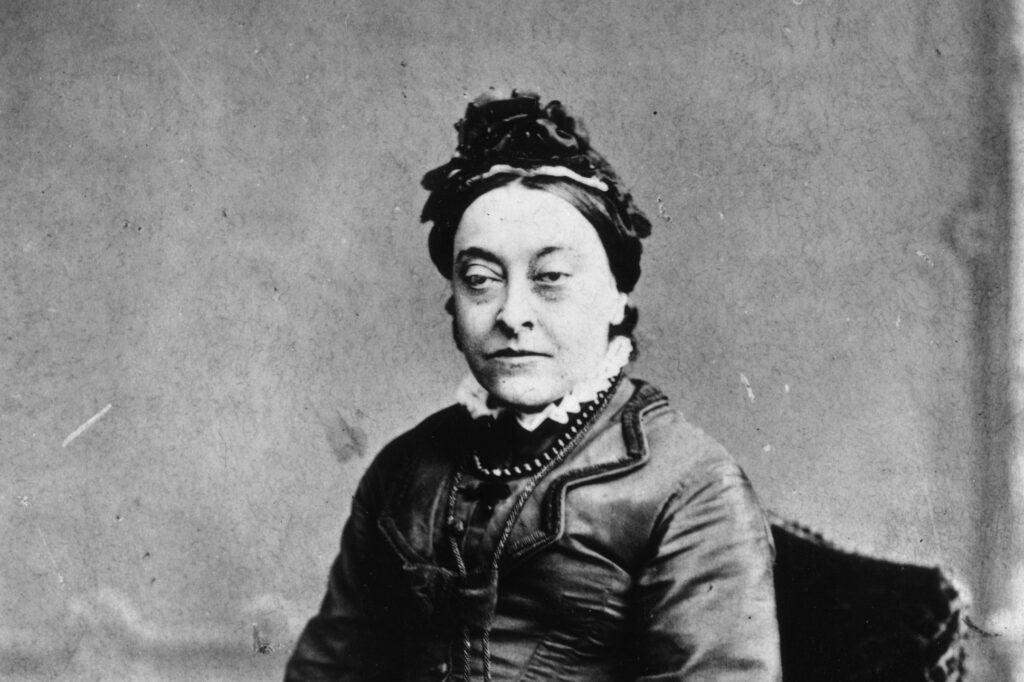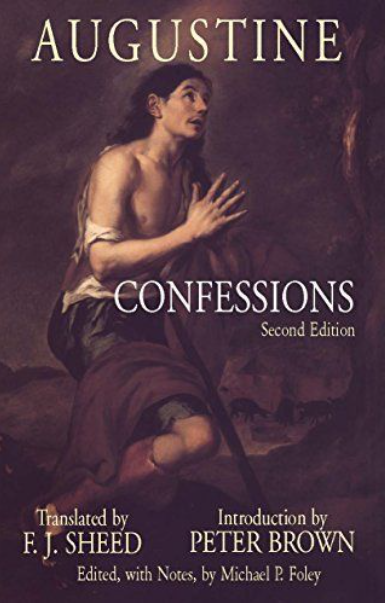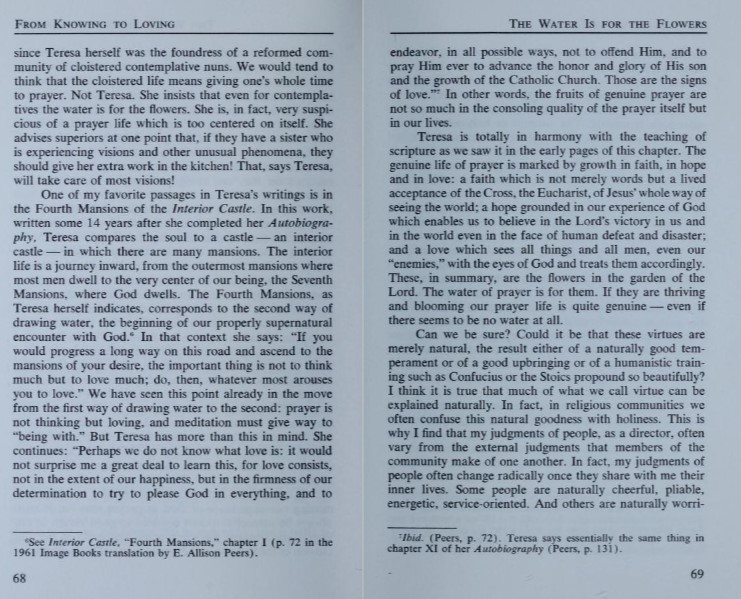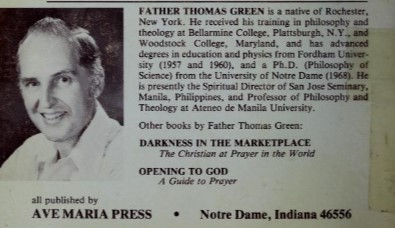What are heavy? Sea-sand and sorrow:
What are brief? To-day and to-morrow:
What are frail? Spring blossoms and youth:
What are deep? The ocean and truth.
A poem by Christina Rossetti

What are heavy? Sea-sand and sorrow:
What are brief? To-day and to-morrow:
What are frail? Spring blossoms and youth:
What are deep? The ocean and truth.
A poem by Christina Rossetti


The recent feast day of St Augustine and the video on conformity sent me reflecting upon the thought of theft, stealing peaches.
But I did not realize this, and rushed on headlong with such blindness that, among my friends, I was ashamed to be less shameless than they, when I heard them boasting of their disgraceful exploits — yes, and glorying all the more the worse their baseness was. What is worse, I took pleasure in such exploits, not for the pleasure’s sake only but mostly for praise. What is worthy of vituperation except vice itself? Yet I made myself out worse than I was, in order that I might not go lacking for praise. And when in anything I had not sinned as the worst ones in the group, I would still say that I had done what I had not done, in order not to appear contemptible because I was more innocent than they; and not to drop in their esteem because I was more chaste.
Behold with what companions I walked the streets of Babylon! I rolled in its mire and lolled about on it, as if on a bed of spices and precious ointments. And, drawing me more closely to the very center of that city, my invisible enemy trod me down and seduced me, for I was easy to seduce. My mother had already fled out of the midst of Babylon and was progressing, albeit slowly, toward its outskirts. For in counseling me to chastity, she did not bear in mind what her husband had told her about me. And although she knew that my passions were destructive even then and dangerous for the future, she did not think they should be restrained by the bonds of conjugal affection — if, indeed, they could not be cut away to the quick. She took no heed of this, for she was afraid lest a wife should prove a hindrance and a burden to my hopes. These were not her hopes of the world to come, which my mother had in thee, but the hope of learning, which both my parents were too anxious that I should acquire — my father, because he had little or no thought of thee, and only vain thoughts for me; my mother, because she thought that the usual course of study would not only be no hindrance but actually a furtherance toward my eventual return to thee. This much I conjecture, recalling as well as I can the temperaments of my parents. Meantime, the reins of discipline were slackened on me, so that without the restraint of due severity, I might play at whatsoever I fancied, even to the point of dissoluteness. And in all this there was that mist which shut out from my sight the brightness of thy truth, O my God; and my iniquity bulged out, as it were, with fatness!
Theft is punished by thy law, O Lord, and by the law written in men’s hearts, which not even ingrained wickedness can erase. For what thief will tolerate another thief stealing from him? Even a rich thief will not tolerate a poor thief who is driven to theft by want. Yet I had a desire to commit robbery, and did so, compelled to it by neither hunger nor poverty, but through a contempt for well-doing and a strong impulse to iniquity. For I pilfered something which I already had in sufficient measure, and of much better quality. I did not desire to enjoy what I stole, but only the theft and the sin itself.
There was a pear tree close to our own vineyard, heavily laden with fruit, which was not tempting either for its color or for its flavor. Late one night — having prolonged our games in the streets until then, as our bad habit was — a group of young scoundrels, and I among them, went to shake and rob this tree. We carried off a huge load of pears, not to eat ourselves, but to dump out to the hogs, after barely tasting some of them ourselves. Doing this pleased us all the more because it was forbidden. Such was my heart, O God, such was my heart — which thou didst pity even in that bottomless pit. Behold, now let my heart confess to thee what it was seeking there, when I was being gratuitously wanton, having no inducement to evil but the evil itself. It was foul, and I loved it. I loved my own undoing. I loved my error — not that for which I erred but the error itself. A depraved soul, falling away from security in thee to destruction in itself, seeking nothing from the shameful deed but shame itself.
Now there is a comeliness in all beautiful bodies, and in gold and silver and all things. The sense of touch has its own power to please and the other senses find their proper objects in physical sensation. Worldly honor also has its own glory, and so do the powers to command and to overcome: and from these there springs up the desire for revenge. Yet, in seeking these pleasures, we must not depart from thee, O Lord, nor deviate from thy law. The life which we live here has its own peculiar attractiveness because it has a certain measure of comeliness of its own and a harmony with all these inferior values. The bond of human friendship has a sweetness of its own, binding many souls together as one. Yet because of these values, sin is committed, because we have an inordinate preference for these goods of a lower order and neglect the better and the higher good — neglecting thee, O our Lord God, and thy truth and thy law. For these inferior values have their delights, but not at all equal to my God, who hath made them all…






Poem by Dorianne Laux 1952 –
Moonlight pours down
without mercy, no matter
how many have perished
beneath the trees.
The river rolls on.
There will always be
silence, no matter
how long someone
has wept against
the side of a house,
bare forearms pressed
to the shingles.
Everything ends.
Even pain, even sorrow.
The swans drift on.
Reeds bear the weight
of their feathery heads.
Pebbles grow smaller,
smoother beneath night’s
rough currents. We walk
long distances, carting
our bags, our packages.
Burdens or gifts.
We know the land
is disappearing beneath
the sea, islands swallowed
like prehistoric fish.
We know we are doomed,
done for, damned, and still
the light reaches us, falls
on our shoulders even now,
even here where the moon is
hidden from us, even though
the stars are so far away.



My point, then, is that it is not the natural qualities of temperament and upbringing which are the marks of a genuine and solid spirituality. It is rather those qualities, those virtues (like a love of the Cross) which transcend the natural and cannot be explained by any merely human formation. Similarly, to turn to the second group of people mentioned above the lack of natural virtues is not necessarily a sign of a faulty spirituality. Let me give an example which the person in question has permitted me to share and which is actually typical of several experiences I have had. Some years ago a sister who was evidently a very strong personality asked me to be her spiritual director. As we shared I was more and more aware of her domineering temperament, and yet at the same time of her sincere desire to be truly given to the Lord. (At the beginning. I think, she tried to dominate him, too! ) He made it clear to her, with a few helpful hints from me, that this could not be. She found herself more and more willing to surrender to him and to let him be the boss. It was a hard fight! At one point her superior (not knowing, of course, or having any right to know what Sister X and I had shared, but knowing I was her director) said to me: *You have said in your conferences to the community that the fruit of a good interior life is growth in the virtues. How can Sister X have a genuine prayer life when she is so difficult in community? Would this not imply that something is wrong with her prayer?” At first sight the answer would seem to be a clear “Yes”. I was not so sure. I find, as a director, that such situations are very tricky to handle, since the absolute confidentiality of the direction situation must be respected. I usually respond by asking a question of the superior (e.g. “What precisely makes you feel Sister X is so difficult in community?”), and thus restrict the discussion to what the person now sitting in front of me knows and wishes to share. In this case I asked further whether there had been any improvement over the past year or two, and the superior said there had been definite improvement but certainly not total change. Sister X could still be quite overbearing, demanding, insensitive to others – obviously not good symptoms. And yet I made an interior judgment, admittedly hesitant and tentative, that Sister X was probably genuinely prayerful and on the right path to God.
What made me think so? Such judgments of a director are often “intuitive” (analogous to a doctor’s, they depend much on his total experience as a director) and they depend much on his own prayerful discernment of how the Lord is working in a given situation. As such they are difficult to rationalize. But I think I can indicate certain factors that were good “signs'” in the given case. First of all, Sister X seemed to have been very open to me and quite candid. She saw things from her own point of view, of course, but the picture the superior gave me of the community life did not essentially differ from the picture I already had from Sister X. Secondly, I was able to be quite frank with Sister X and she accepted this frankness humbly and with grace; moreover, the Lord seemed to be equally frank with her in her prayer, as she shared it with me. Thirdly, and perhaps most importantly, when external difficulties and frustrations arose, she was able to see them and accept them (though not without much frustration and occasional bouts of self-pity) as precisely what she needed to be purified, to be “tamed.” There was a final sign which may. seem small but which I have come to value highly as a director: When Sister X and I talked, she focused on her own life, her own failings, the ways I could help her to grow. She was not like the wife who confesses everybody else’s sins–the husband’s, the children’s—in the process of ostensibly confessing her own. To me this is very good sign and a solidly based spirituality.
‘When the Well Runs Dry; Prayer Beyond the Beginnings’ by Father Thomas H. Green, S.J.


Recent Comments